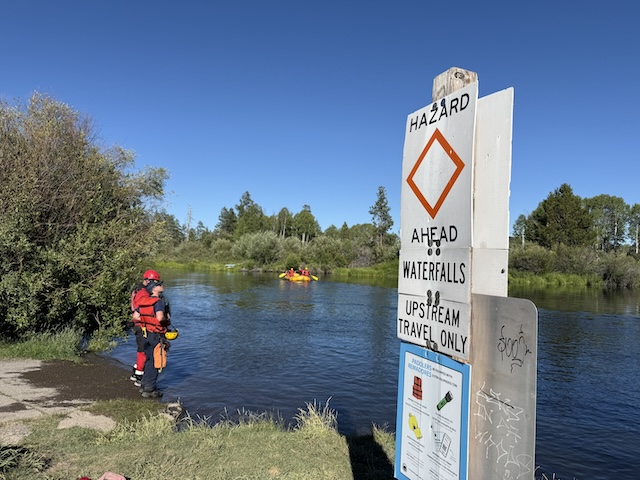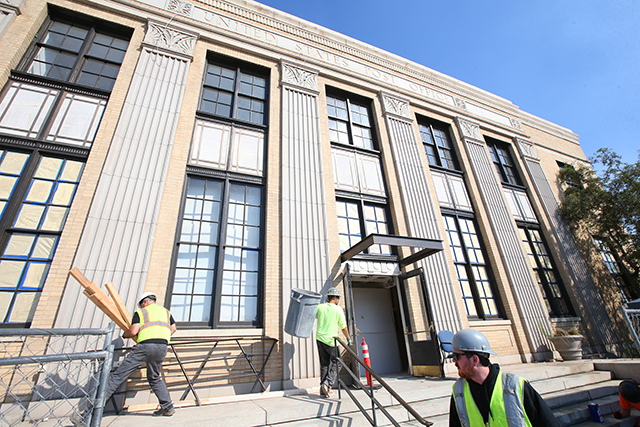Camp Sherman gets a visit from Dominick Dunne documentarians
Published 5:00 am Sunday, September 23, 2007

- Joyce Osika stands on her porch in Camp Sherman last week. In 1979, when Osika co-owned Twin View Resort, she began a friendship with author Dominick Dunne, who hunkered down in a rented cabin to write his first novel.
CAMP SHERMAN — A trio of Australian filmmakers paid a brief visit here early last week, temporarily turning the living room of resident Joyce Osika into a makeshift film set.
On Tuesday morning, Osika sat in a chair and quietly offered her recollections of author and Vanity Fair columnist Dominick Dunne, with whom she has remained friends since 1979 when he rented a cabin from her and her now-deceased husband, Nick.
Trending
“The people in Camp Sherman … some of them met him when he was here, and they would invite him out for a meal once in a while, But, basically, we were his sole supporters while he lived here.”
At the time of Dunne’s arrival, Osika was 50. She’d been born in England and studied nursing there. In 1953, she and her husband moved to the U.S., settling in Portland. In 1977, they bought Twin View Resort.
“If I hadn’t have come to Oregon, I probably wouldn’t have stayed,” Osika said.
And if Dominick Dunne hadn’t have come to Oregon, he might not have become the successful writer he is at the age of 81.
In his first career, Dunne had been a successful TV producer and, by all accounts, an unrepentant Hollywood gadabout.
According to Timothy Jolley, the film’s co-director and producer, Dunne had enjoyed “some success in Hollywood as a film producer, and things started to go badly for him. He was drinking a bit and needed to get away for a while.”
Trending
Dunne, who could not be reached for comment, told January Magazine in a 2001 interview, “I got caught up in all that Hollywood s—.”
Dunne, 53 and divorced at the time, “jumped in his car and headed north, got a flat tire near Camp Sherman, and ended up staying for several months and got over some of the problems that he was having at that time,” Jolley said.
But Osika thinks Dunne had some foreknowledge of Camp Sherman.
“He did tell me that a lady in his apartment had suggested to him, ‘If you want quiet and solitude, go to Camp Sherman.’ He did tell me that.” But, it was only because of the flat tire, that he “accidentally found Camp Sherman.”
Added co-director and producer Kirsty de Garis, who conceived the idea for the film after interviewing Dunne in 2003 for an Australian magazine: “He just partied too much,” she said. “He stopped everything while he was here.”
While he was in Camp Sherman, Dunne, with his insider’s knowledge of Hollywood, was tapped to ghost-write “The Winners,” a sequel to “The Users,” a Tinseltown novel by Joyce Haber.
“He knew all the players,” said de Garis. “I think he sort of volunteered himself.”
Thus began the first stage of Dunne’s career metamorphosis.
In 1982, his daughter, Dominique, who had starred in the film “Poltergeist,” was strangled, went into a coma and died. Dunne wrote about the trial of his daughter’s ex-boyfriend for Vanity Fair and soon became known for writing about the misdoings of America’s wealthy and elite, a class he understands and has uncanny access to.
As January Magazine wrote, “He has lived in and among both the bluebloods and Hollywood royalty. He loves it unabashedly.”
Which makes it seem even stranger to think that, for a few pivotal months in late 1979 and early 1980, he rented a small cabin in Camp Sherman.
De Garis recalled interviewing Dunne in 2003. “We got along very well,” she said.
In 2005, she wrote him and proposed making a documentary about his life.
“I just wrote to him and said, ‘I think you’re fascinating; do you want to make a documentary.’
“He said, ‘OK.’ Actually, he said, ‘Why don’t we discuss it over lunch in New York?’”
They did, and the film began shooting in November in New York. Dunne has given them plenty of access, even while he’s been covering the high-profile trial of legendary music producer Phil Spector.
“We’ve been in L.A. for a week,” she said. “He’s been on verdict-watch, which has made it more difficult.”
After that, they’ll follow Dunne back to New York and Connecticut, where he lives.
This is the filmmakers’ third and last trip to the States for the film, which they need to wrap up in a few weeks and hope to release next year.
While de Garis spoke, Jolley and cinematographer Andrew Commis quickly moved equipment outside to film “The Dominick Dunne Cabin,” as a sign outside proclaims the small, non-descript edifice in which Dunne lived and wrote 27 years ago.
De Garis said she finds his life story compelling because “he’s had triumphs and tragedies, and he’s really overcome extraordinary odds, and he’s still an optimist.”
Jolley said that as a writer, Dunne “really seems to be peaking now. … He still has so much energy and drive, and, in that sense, he’s an inspiration to a lot of people, I think.”
Added de Garis: “He’s 82 on the 30th of October, and he’s more famous now than he ever has been. Which is pretty rare. Most people peak earlier and fizzle out.”
What keeps Dunne going?
“That’s one of the things we’re trying to find out with this film,” de Garis said.
At the end of filming their sequence with Osika, the filmmakers offered assurances of how well she had done.
“I’m a nurse,” she said, chuckling. “I’m not a correspondent.”








